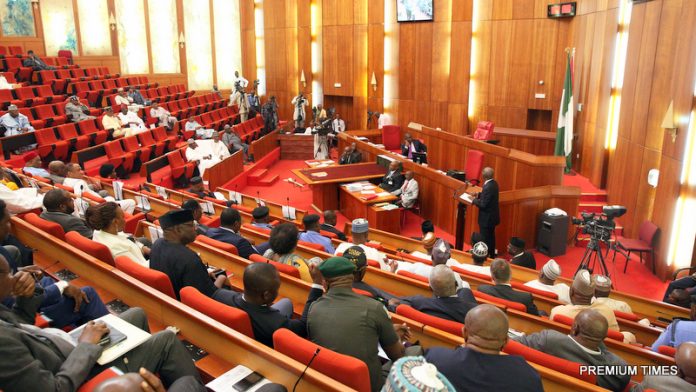The Senate, on Thursday, resumed its debate on the Tax Reform Bills.
The bills are a set of four legislative proposals to increase Value-Added Tax (VAT) distributable to the sub national governments to 55 per cent while reducing the federal government’s share to 10 per cent.
These far-reaching initiatives were contained in the lead debate of the Leader of the Senate, Sen. Opeyemi Bamidele on the Tax Reform Bills presented during plenary.
Bamidele said that the new legislative regimes also proposed zero VAT on exports and essential consumptions by the masses.
Leading the debate, Bamidele reeled out far-reaching proposals contained in the Tax Reform Bills.
According to him, the proposals aims at simplifying the tax landscape, reducing the burden on small business and streamlining how taxes are collected.
In the area of tax exemptions, he pointed out that those, whose salaries are not more than the minimum wage from Pay As You Earn (PAYE) deductions, would be exempted from the tax regime.
He also said small businesses with annual turnover of N50 million or less “are equally exempted from payment of taxes,” a key pro-business initiative that encourages job creation; deepens ease of doing business and incentivises more investments.
Similarly, the senate leader explained that there was a proposed huge reduction in company income tax from the current 30 per cent to 25 per cent that would last for at least two years.
He said: “As part of deliberate attempt to curtail the incidence of double taxation and multiplicity of taxes and levies.
“And multiple taxes hitherto paid by companies under various tax heads namely, 2.5 per cent education tax, 0.25 per cent NASENI tax have been harmonised.
“They have been harmonised into a development level of 2 per cent which by 2030, will be applied to fund the newly established student loan scheme which will benefit many Nigerian youths.
“Unlike what is obtainable under the existing tax regime whereby the Federal Government takes a lion share of VAT revenues…
“It is proposed that the sharing formula should allow the State Government share 55 per cent of VAT revenue from the current 15 per cent to 10 per cent sharing formula.
“However, Local Governments share of VAT revenue remains unaffected. Relatedly, basic items consumed by Nigerian households such as food items, medical services and pharmaceuticals, educational fees, electricity etc. are exempted from VAT”.
In his contribution, former Chief Whip of the Senate, Ali Ndume (APC-Borno) claimed that his problem with the bills was about timing and the issue of derivation.
He added that the Constitution of the Federal Republic of Nigeria, 1999 (as amended) must be amended before the Tax Reform Bills should take effect, therefore calling for its immediate withdrawal.
Ndume said: “I am not against the reform, my problem is timing and the issue of derivation make the reform contagious. The 1999 Constitution has to be amended before the bills can be effective.”
However, the Chief Whip of the Senate, Sen. Mohammed Monguno expressed strong objection to Ndume’s submissions, asking the Senate to disregard it and pass the bills for second reading.
Monguno urged the Senate to pass the bill into second reading, advocating that all areas of concern would be addressed at the public hearing stage.
After the debate that featured Sen. Sani Musa (APC-Niger) and Sen. Seriake Dickson (PDP-Bayelsa), the Senate unanimously passed the bills into second reading following Monguno’s final position.
In his remarks, the President of the Senate, Godswill Akpabio, referred the bills to the Senate Committee on Finance, advising the committee to invite all the stakeholders to the public hearing to address all areas of concern.
The News Agency of Nigeria (NAN) reports that the Federal Executive Council (FEC) had proposed the Tax Reform Bills comprising the Joint Revenue Board of Nigeria (Establishment) Bill, 2024.
Others are Nigeria Revenue Service (Establishment) Bill, 2024; Nigeria Revenue Service (Establishment) Bill, 2024 and Nigeria Tax Bill, 2024.(NAN)


